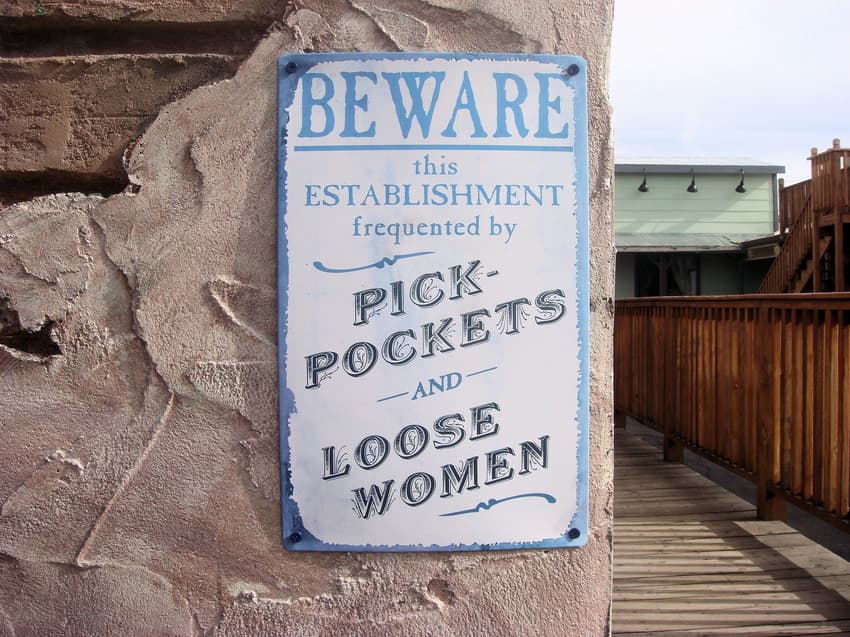Six tourist scams to be aware of in Austria

Planning a visit to Austria? While the Alpine nation is one of the world's safest, there are a few things to be aware of.
Austria is a safe country for tourists and residents alike. Fortunately, serious crime is rare and the following are very much an exception rather than the rule.
However, it always a good advice for a visitor to any foreign country to stay alert, be cautious, and not fall prey to tricksters out to get your money.
Many of these scams are not typically Austrian. In fact you'll likely encounter them in many countries and many big cities, but could encounter them while visiting Austria so it's worth being aware.
One thing to remember is that these scams are very much targeted at tourists, which means you are likely to encounter them in locations popular with tourists - real or online.
Scams which you might see elsewhere - such as dodgy taxi meters, fake tourist prices at restaurants or fake tour guides - are not common in Austria, but are still worth looking out for.
If you're visiting a popular tourist site or trying to scout accommodation online, best to be on your toes. If you see something fishy, call the police on 133.
Have we missed one? Get in touch at [email protected].
Rental scam
If you opt to rent a flat or holiday apartment rather than stay in a hotel, keep in mind that not all advertisements you see online are legitimate.
These false ads invariably feature photos of beautiful properties for prices that are totally incompatible with reality — for instance, a fully furnished large studio in the centre of Vienna or Innsbruck at rock bottom prices.
How do you know such offers are scams? Usually if it seems too good to be true, then it is.
But there are a few other telltale signs.
One example is if the landlord tells you he or she will send the key by mail — after you pay one month’s rent in advance.
Another is to ask for specific personal details, like a copy of your passport, before you visit the apartment.
In order to avoid this, try and book through reputable sites - although this is no guarantee, as scammers can find there way to AirBnb and other well-known accommodation companies.
For an extensive summary of some of the scams to watch out for in Austria, check out the following link.
EXPLAINED: Five common apartment scams in Austria
'Deaf' people asking for money
If you sit in an outdoor café and a person carrying a little sign approaches you asking for money, beware.
The sign says (often in several languages) that the person is deaf and asks for a donation for the organisation helping people with hearing impairments.
You can be sure this is a scam. How?
Generally, most charities and advocacy groups do not collect cash then and there.
Instead, they'll ask for your contact details and want you to make a regular contribution, so be wary. If you are unsure, don't hesitate to ask for ID.
Fake ticket checkers or police
If you're in a different country, being approached by a person in an official capacity can put you at ease - which is why scams of this nature can be effective.
Austria's Ministry of the Interior has warned of people dressed as police officers targeting tourists, particularly tourists of Asian appearance. Russian and American tourists have also been targeted, with the US Embassy in Austria issuing similar warnings.
One scam reported in Vienna involves people dressed as police officers with fake identification approaching tourists and asking for their ID. When the tourists handed over their wallets, they were later returned with the cash taken.
Similar scams can be carried out by people pretending to check your train tickets.
As many Austrian train stations do not have barriers, your ticket will be checked by an official ticket checker roaming the train.
Always ask to see official ID and never hand over anything without being sure.
READ MORE: What you need to know about Austria’s ‘fake cop’ scam
The ‘bonneteau’ game scam
This particular scam used to be widespread in many parts of Europe but is now outlawed.
However, you could still come across it somewhere in the dark corners of Austrian tourist sites, as scammers will hide away from authorities.
A person will invite you to play a game where a small ball is moved under three cups; you must place a bet (starting at 100 euros!) and guess under which cup the ball is hidden.
This is akin to throwing your money out the window because you will never win — but lose plenty if you are drawn into this scam.

If the person 'winning' looks like the brother of the dealer, you're probably witnessing a scam.
‘Free stuff’ scam
Say you are walking down a street and someone approaches you and offers you a something for free. It could be a flower, a ‘friendship bracelet’, or anything else. The moment you take it, the person demands money and causes a scandal if you refuse to pay.
READ MORE: How to avoid rental scams in Austria
These people could be disguised as Buddhist monks or other trustworthy figures, but don’t accept anything from anybody you don’t know.
If this does happen to you and the person threatens you when you refuse to pay, just walk away. The law is on your side, not theirs.

Never accept 'freebies' from anyone. Photo: Photo by Zoe Schaeffer on Unsplash
Pickpockets and distraction techniques
These people ply their trade in crowded tourist spots, so be careful about how you carry your belongings.
They are much more sophisticated than pickpockets of yore who merely slid their hand in a back pocket of your pants and took your wallet.
These days, they are more likely to operate in gangs or at least teams of two — one person will distract you (by bumping into you, for example, or by telling you that you have something like bird poo on your shirt) while the other will cut the strap of your bag and run away or simply take your phone or wallet.
Another scam involves pressing up close to you and 'dancing' with you, while removing valuables from your bag or pocket.
Perhaps the most common trick combines the fake charity scams listed above with pickpocketing. It is particularly effective for people sitting at cafes or bars who have their phone or wallet sitting on the table.
Scammers will carry a clipboard or pretend to sell/donate magazines.
They'll walk over to where you are sitting and hold the clipboard over it, asking you to donate or sign a petition. This will obscure your view of your valuables, which they will pocket.
To avoid these scams, act like a local. Walk briskly through crowded places and carry only the basic necessities with you, leaving valuables in your hotel room. And never put your phone, wallet or other valuables on a bar or table.
READ MORE: Austrian police warn of fake DHL text message scam
Other than all of the above, enjoy your holiday!
Comments
See Also
Austria is a safe country for tourists and residents alike. Fortunately, serious crime is rare and the following are very much an exception rather than the rule.
However, it always a good advice for a visitor to any foreign country to stay alert, be cautious, and not fall prey to tricksters out to get your money.
Many of these scams are not typically Austrian. In fact you'll likely encounter them in many countries and many big cities, but could encounter them while visiting Austria so it's worth being aware.
One thing to remember is that these scams are very much targeted at tourists, which means you are likely to encounter them in locations popular with tourists - real or online.
Scams which you might see elsewhere - such as dodgy taxi meters, fake tourist prices at restaurants or fake tour guides - are not common in Austria, but are still worth looking out for.
If you're visiting a popular tourist site or trying to scout accommodation online, best to be on your toes. If you see something fishy, call the police on 133.
Have we missed one? Get in touch at [email protected].
Rental scam
If you opt to rent a flat or holiday apartment rather than stay in a hotel, keep in mind that not all advertisements you see online are legitimate.
These false ads invariably feature photos of beautiful properties for prices that are totally incompatible with reality — for instance, a fully furnished large studio in the centre of Vienna or Innsbruck at rock bottom prices.
How do you know such offers are scams? Usually if it seems too good to be true, then it is.
But there are a few other telltale signs.
One example is if the landlord tells you he or she will send the key by mail — after you pay one month’s rent in advance.
Another is to ask for specific personal details, like a copy of your passport, before you visit the apartment.
In order to avoid this, try and book through reputable sites - although this is no guarantee, as scammers can find there way to AirBnb and other well-known accommodation companies.
For an extensive summary of some of the scams to watch out for in Austria, check out the following link.
EXPLAINED: Five common apartment scams in Austria
'Deaf' people asking for money
If you sit in an outdoor café and a person carrying a little sign approaches you asking for money, beware.
The sign says (often in several languages) that the person is deaf and asks for a donation for the organisation helping people with hearing impairments.
You can be sure this is a scam. How?
Generally, most charities and advocacy groups do not collect cash then and there.
Instead, they'll ask for your contact details and want you to make a regular contribution, so be wary. If you are unsure, don't hesitate to ask for ID.
Fake ticket checkers or police
If you're in a different country, being approached by a person in an official capacity can put you at ease - which is why scams of this nature can be effective.
Austria's Ministry of the Interior has warned of people dressed as police officers targeting tourists, particularly tourists of Asian appearance. Russian and American tourists have also been targeted, with the US Embassy in Austria issuing similar warnings.
One scam reported in Vienna involves people dressed as police officers with fake identification approaching tourists and asking for their ID. When the tourists handed over their wallets, they were later returned with the cash taken.
Similar scams can be carried out by people pretending to check your train tickets.
As many Austrian train stations do not have barriers, your ticket will be checked by an official ticket checker roaming the train.
Always ask to see official ID and never hand over anything without being sure.
READ MORE: What you need to know about Austria’s ‘fake cop’ scam
The ‘bonneteau’ game scam
This particular scam used to be widespread in many parts of Europe but is now outlawed.
However, you could still come across it somewhere in the dark corners of Austrian tourist sites, as scammers will hide away from authorities.
A person will invite you to play a game where a small ball is moved under three cups; you must place a bet (starting at 100 euros!) and guess under which cup the ball is hidden.
This is akin to throwing your money out the window because you will never win — but lose plenty if you are drawn into this scam.

If the person 'winning' looks like the brother of the dealer, you're probably witnessing a scam.
‘Free stuff’ scam
Say you are walking down a street and someone approaches you and offers you a something for free. It could be a flower, a ‘friendship bracelet’, or anything else. The moment you take it, the person demands money and causes a scandal if you refuse to pay.
READ MORE: How to avoid rental scams in Austria
These people could be disguised as Buddhist monks or other trustworthy figures, but don’t accept anything from anybody you don’t know.
If this does happen to you and the person threatens you when you refuse to pay, just walk away. The law is on your side, not theirs.

Never accept 'freebies' from anyone. Photo: Photo by Zoe Schaeffer on Unsplash
Pickpockets and distraction techniques
These people ply their trade in crowded tourist spots, so be careful about how you carry your belongings.
They are much more sophisticated than pickpockets of yore who merely slid their hand in a back pocket of your pants and took your wallet.
These days, they are more likely to operate in gangs or at least teams of two — one person will distract you (by bumping into you, for example, or by telling you that you have something like bird poo on your shirt) while the other will cut the strap of your bag and run away or simply take your phone or wallet.
Another scam involves pressing up close to you and 'dancing' with you, while removing valuables from your bag or pocket.
Perhaps the most common trick combines the fake charity scams listed above with pickpocketing. It is particularly effective for people sitting at cafes or bars who have their phone or wallet sitting on the table.
Scammers will carry a clipboard or pretend to sell/donate magazines.
They'll walk over to where you are sitting and hold the clipboard over it, asking you to donate or sign a petition. This will obscure your view of your valuables, which they will pocket.
To avoid these scams, act like a local. Walk briskly through crowded places and carry only the basic necessities with you, leaving valuables in your hotel room. And never put your phone, wallet or other valuables on a bar or table.
READ MORE: Austrian police warn of fake DHL text message scam
Other than all of the above, enjoy your holiday!
Join the conversation in our comments section below. Share your own views and experience and if you have a question or suggestion for our journalists then email us at [email protected].
Please keep comments civil, constructive and on topic – and make sure to read our terms of use before getting involved.
Please log in here to leave a comment.